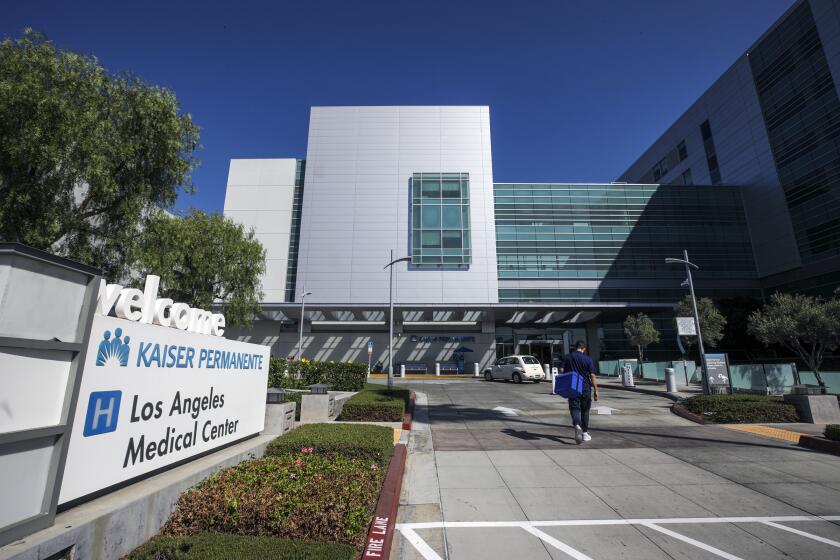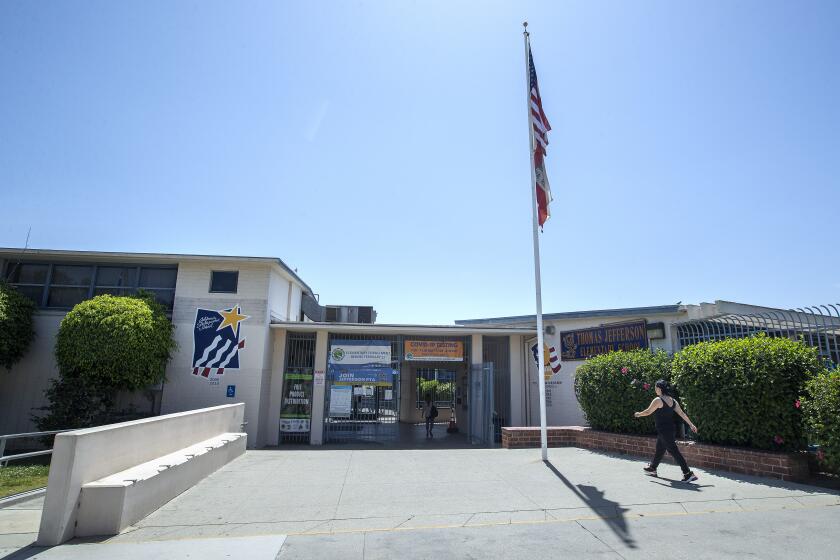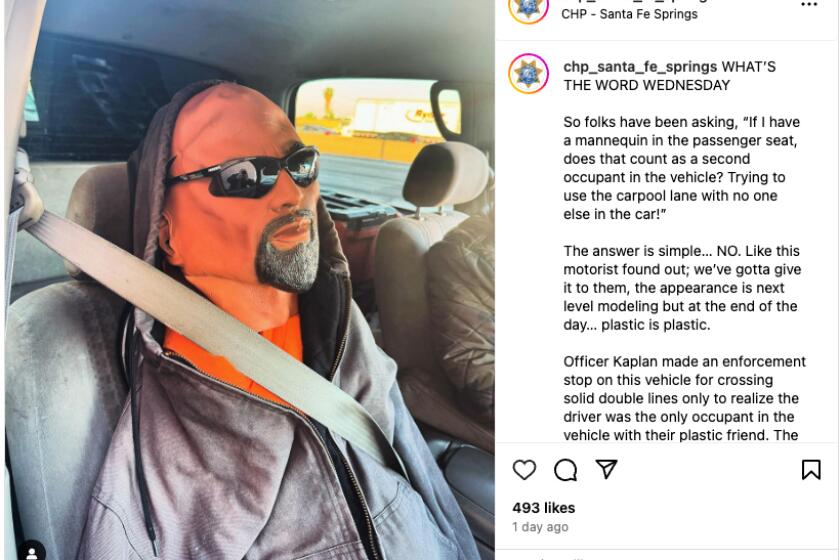Column: South L.A. rally takes aim at sex trade
The hundreds of people marching against prostitution on Saturday, along one of the city’s busiest sex-for-sale corridors, were a sign of how the tide has turned and the weapons have changed in the battle against what used to be considered a “victimless crime.”
The area south of Adams Boulevard and Western Avenue in South Los Angeles has long been the scene of protests by locals concerned about neighborhood blight: condoms in driveways and the tawdry spectacle of women in hot pants gathered near school bus stops.
But the crime that was the focus of Saturday’s march can’t be fixed with brighter street lights or fewer seedy motels.
It’s considered “sex trafficking” or “sexual slavery” now. And prostitutes are not the problem, they are the victims: young women imprisoned by ruthless pimps, creepy johns and painful childhoods heavy on trauma and light on love.
“This is not a lifestyle choice,” Mayor Eric Garcetti told the crowd gathered at St. Brigid’s Church, where the march ended with a rally promoting services for victims. “We are not going to put you in jail,” he promised. “We are going to put the men who caused your oppression in jail for a long time.”
The event was organized by Los Angeles County Supervisor Mark Ridley-Thomas, whose district includes some of the county’s best known prostitution hot spots. It drew a cross-section of people from churches, community groups, the YMCA, the Junior League, fraternities and sororities.
They carried signs in English and Spanish: “Brothers, Protect Our Sisters.” “Women Are NOT a Commodity.” “Our Children Are Not for Sale.”
“We are sending a message to pimps today,” Ridley-Thomas said. “You cannot hide.”
::
It’s an evolution in thinking that’s long overdue, but not embraced by everyone yet.
Like the woman watching the protest march from her front lawn at 42nd Street and Western Avenue. She sees prostitutes often enough that she has learned to recognize the regulars. “The cops round them up in the morning,” she said, “and they’re back on the streets that night.”
She didn’t want to give her name, but she told me she doesn’t consider prostitutes victims, just working girls, trying to make a living in a tough economy. “As long as it’s not noisy, and they don’t open this gate, it doesn’t bother me,” she said.
“I’m not trying to put them down. It’s a job they choose. It’s not my place to judge them.”
D’lita Miller would argue with that. She was 11, an honor student about to enter seventh grade, when she was kidnapped, gang-raped and passed around for two days among men who paid to have sex with her. “When I got back home, there was no counseling or anything,” she said.
At 15, she got pregnant. By 21, she had four children — and a string of boyfriends who persuaded her to sell her body. “They’d say ‘You’re having sex for free; you might as well make some money to buy milk for your baby.’ ”
She spent 15 years as a prostitute, growing numb to the abuse. She tried several times to break ties with pimps, enroll in school and find work, she said. “But you go back because you don’t feel like there is anything else to make money that you know how to do.”
Her perspective changed when her 16-year-old daughter was invited to a party by a 13-year-old friend and wound up among a group of girls who were peddled around the region by a sex trafficking ring.
“It was painful to think that I’d let my daughter down,” Miller said as we listened to speakers at the rally pledge help to young victims.
Now, drawing on her own experience, she has launched a self-help group: Families Against Sex Trafficking, for mothers who don’t know what to do when daughters disappear into prostitution rings.
::
That kind of grass-roots effort will be important in reclaiming girls from the streets. So will the attention to social issues that’s being promised by politicians.
The state Legislature is trying to raise money to help victims by imposing hefty fines on pimps who traffic and johns who solicit underage girls. The district attorney is launching a diversion program that lets girls arrested for prostitution get treatment instead of jail.
Many of those girls come from foster care and have been repeatedly neglected or sexually abused. Some are addicts, many are homeless, some consider their pimp boyfriends the only men who will ever love them. Without mental health counseling, education, job training, treatment for drug abuse, troubled teenagers have a hard time seeing alternatives.
“We’ve got to swarm these girls with love,” said the Rev. Deborah Manns, who launched her own grass-roots effort 10 years ago, when she noticed that dozens of prostitutes as young as 17 waited every Friday night for customers on corners near her church at Florence and Vermont avenues.
She tried to talk to them, but they waved her off. “They said ‘You can pray for us, but this is the life we choose,’ ” she recalled.
Now, Manns works with police, probation officers and parents to reclaim runaway girls before they get in too deep. She has a team of high school students who scour Instagram, Twitter and Facebook for clues about teenagers named in missing person reports.
“We go to parties, we go to parks, we go to malls,” she said. “We go wherever they are. I will chase a girl down the street, grab her, hold her, fight her ... whatever it takes to keep her from going back to the track” — the stretch of Figueroa Boulevard where trafficking victims are often forced to sell their bodies.
“I know they think I’m crazy,” she said, “but sometimes that’s what it takes to let them know that somebody is going to be there for them. That we’re not going to let go.”
More to Read
Start your day right
Sign up for Essential California for news, features and recommendations from the L.A. Times and beyond in your inbox six days a week.
You may occasionally receive promotional content from the Los Angeles Times.







